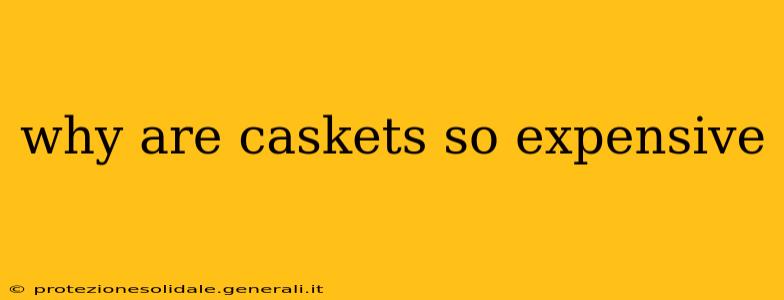The cost of a casket can range dramatically, from a few hundred dollars to tens of thousands. This wide price range often leaves families bewildered and questioning why such a seemingly simple item can command such high prices. The truth is, several factors contribute to the high cost of caskets, and understanding these factors can help you make informed decisions during a difficult time.
What Factors Contribute to the High Cost of Caskets?
Several key elements drive up casket prices. Let's break them down:
1. Materials and Manufacturing:
- Wood: High-quality hardwoods like mahogany, cherry, and walnut are expensive, requiring skilled craftsmanship and extensive processing. These woods are durable, aesthetically pleasing, and command a premium price. Less expensive caskets may utilize particleboard or less durable wood species.
- Metals: Bronze and copper caskets are particularly costly due to the raw material prices and the intricate craftsmanship often involved in their design and construction. Steel caskets represent a more affordable metal option.
- Finishes and Upholstery: The level of detail in the finish, including hand-carving, intricate inlays, and high-quality upholstery (e.g., velvet, silk), significantly impacts the price. Simpler finishes and less luxurious materials reduce costs.
- Manufacturing Process: The labor involved in crafting a casket, particularly those with ornate details, adds to the overall expense. Automated manufacturing processes can lower costs, but still contribute to the price tag.
2. Retail Markups:
Funeral homes typically mark up the price of caskets significantly, generating a substantial profit margin. This markup contributes significantly to the overall cost the consumer pays. It's important to remember that funeral homes are businesses operating under complex regulatory frameworks; hence, prices are influenced by their profit goals.
3. Features and Options:
- Interior Linings: The type of lining, whether it's a simple cotton lining or a more luxurious satin or velvet lining, affects cost.
- Exterior Features: Details like handles, hinges, and decorative elements can add to the price. Ornate designs and high-quality hardware increase the final cost.
- Supplemental Items: Additional features such as viewing windows, airtight seals, and specialized gasketed features can raise the price considerably.
4. Branding and Prestige:
Some casket manufacturers build their brands on prestige and luxury, employing high-end marketing strategies that influence prices. These brands often use exclusive materials and intricate designs to justify their higher price points.
5. Shipping and Handling:
The transportation costs involved in moving heavy and often large caskets can add to the overall expenditure, particularly if the casket must be shipped across long distances.
Are There More Affordable Casket Options?
Yes, absolutely! Many affordable casket options are available. Consider these alternatives to reduce costs:
- Simple Wood Caskets: Plain wood caskets made from less expensive wood species offer a dignified option at a lower price point.
- Alternative Materials: Caskets made from cardboard or other eco-friendly materials are significantly less expensive.
- Direct Burial: Forgoing a casket entirely and opting for direct burial can drastically reduce funeral costs.
How Can I Find Affordable Caskets?
- Shop Around: Compare prices from multiple funeral homes.
- Consider Direct Burial: As mentioned previously, foregoing a casket and opting for direct burial is highly cost-effective.
- Explore Online Retailers: Online retailers specializing in caskets often offer competitive pricing. However, it's important to ensure they meet all regulatory requirements.
Remember, choosing a casket is a personal decision. It's vital to weigh the various options carefully, factoring in your budget and preferences without feeling pressured into making costly choices. Understanding the factors that contribute to high casket prices empowers you to make informed decisions during a challenging time.
